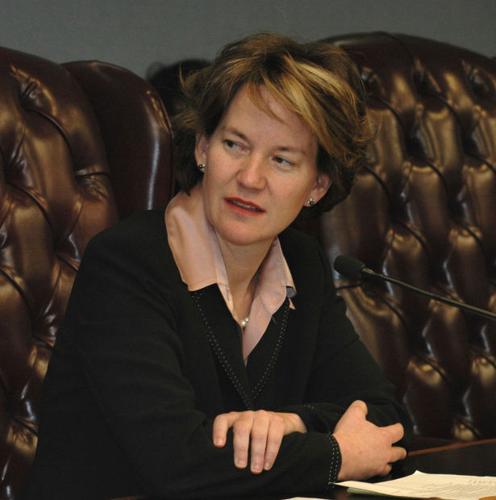PHOENIX — Saying electric companies appear to be trying to kill solar, a former state utility regulator is proposing a constitutional amendment to stop them.
The initiative measure filed Friday by Kris Mayes would block regulated utilities such as Arizona Public Service, Tucson Electric Power, UniSource Energy Services and a host of cooperatives from imposing “demand charges” on customers who generate their own power.
It also would stop utilities’ efforts to reduce the amount of money they credit customers who generate more energy than they use.
Instead, companies would effectively “pay” customers the same charge per kilowatt hour as they would bill the customers.
Utility officials have said the reimbursement changes are necessary to prevent customers without solar from effectively underwriting the cost of the network on which solar customers still depend.
Mayes said studies have shown “that’s a bunch of hooey.” She said utilities are trying to make solar unaffordable because it effectively competes with utility-owned power plants.
“The policies that they are promoting would have the effect of seriously undermining the ability of Arizonans to go solar,” she said.
Her measure, if it qualifies for the ballot and is approved by voters in November, also aims to stop utilities from “dragging their feet” in approving connections between customer-owned solar and the network, Mayes said.
It would require companies to act within 45 days of a request or be prepared to justify to the Arizona Corporation Commission why it cannot comply.
Mayes knows something of what she speaks: As a Republican member of the commission a decade ago, she introduced the concept of “distributed generation” to the state.
The idea was to promote having residents and businesses produce their own power as an alternative to the electricity now largely generated through nuclear, coal and natural gas.
She also was the driving force behind the requirement for utilities to produce at least 15 percent of their energy from alternative sources by 2025, including solar and, in particular, distributed generation.
Since that time the solar industry has flourished in Arizona — and not always at the pleasure of utilities.
In the first case on the issue, the current commission is hearing arguments by UniSource to impose demand charges on its more than 90,000 customers in Mohave and Santa Cruz counties.
That would base power bills on each customer’s highest usage level during a billing period. By contrast, most residential customers now pay a bill based on a fixed monthly cost plus rates based on the amount of electricity used.
The difference could be significant, particularly for solar customers, who have low overall needs but may have a high peak demand at certain times of the day.
UniSource also wants to reduce its “net metering” rate, what it credits customers with rooftop solar for the excess power they produce.
Now customers get a credit equal to what they would otherwise pay at retail; the change would let the utility lower that to its wholesale costs.
TEP, which is owned by the same company as UniSource, and APS are both weighing similar changes, and are waiting to see if the commission goes along with the utility’s plan.
Under Mayes’ proposal, the commission would be powerless to approve any such plan, at least through 2022.
Joseph Barrios, spokesman for UNS, the parent company of both TEP and UniSource, said his company has not had the chance to study the initiative. He made it clear UNS does not want its bid before the commission, to change the rate structure for solar, short-circuited by Mayes’ measure.
“There’s been a great deal of participation by several parties and members of the public throughout the proceedings before the commission and we’re in favor of allowing those issues to be addressed in current proceedings,” he said.
“We’ve presented a significant amount of evidence addressing the shortcomings of the current net metering plans and how proposed changes would be more equitable for all customers while fairly compensating users of solar power systems,” Barrios added.
There was no immediate response from APS.
Mayes conceded she has an uphill fight: She needs to gather 225,963 valid signatures on petitions by July 7 to put the measure before voters.
She hinted that she will have the resources needed to hire paid circulators to meet the deadline.
She declined to give specifics on Friday, saying her campaign committee, formally known as Yes on AZ Solar, will file its first financial disclosure form on Tuesday.
“That will demonstrate that the resources that are needed for this fight will be there,” she said. “We’re going to make sure we do everything we can to make sure that Arizonans have the right to decide this issue for themselves.”
A spokeswoman for the commission, which is considering the UniSource request and would have to rule on the others, said Chairman Doug Little has not had a chance to review the initiative and had no immediate comment.






